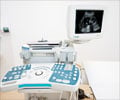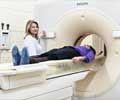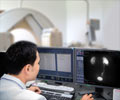Glossary
Radiology: The branch of the health sciences dealing with radioactive substances and radiant energy and with the diagnosis and treatment of disease by means of both ionizing (e.g., x-rays) and nonionizing (e.g., ultrasound) radiation.
Radioisotope: An isotope, which is radioactive; one having an unstable nucleus and emitting characteristic radiation during its decay to a stable form. Radioisotopes have important diagnostic and therapeutic uses in clinical medicine and research.
Radioactivity: The quality of emitting or the emission of corpuscular or electromagnetic radiations consequent to nuclear disintegration, a natural property of all chemical elements of atomic number above 83, and possible of induction in all other known elements.
Half-life: The time required for the decay of half of a sample of particles of a radionuclide or elementary particle.
Biological half-life: The time required for a living tissue, organ, or organism to eliminate one half of a radioactive substance, which has been introduced into it.
Radiation: Energy transmitted by waves through space or through some medium; usually referring to electromagnetic radiation when used without a modifier
Gamma camera: A scanner that detects the movement of a radiopharmaceutical, emitting gamma radiation during it’s movement through the human body.
Radiopharmaceutical: a radioactive pharmaceutical, nuclide, or other chemical used for diagnostic or therapeutic purposes.
 MEDINDIA
MEDINDIA
 Email
Email











My son's left testis is missing,age 13 plus,mri usg notable to locate, will it be possible to locate the same testtis if it is there or not by which test? will the radio isotope test be fruitful? if yes, is there any harm or which test will you suggest and if it is available in kolkata address plz. wt is phelbography test and in kolkata where this facility available?